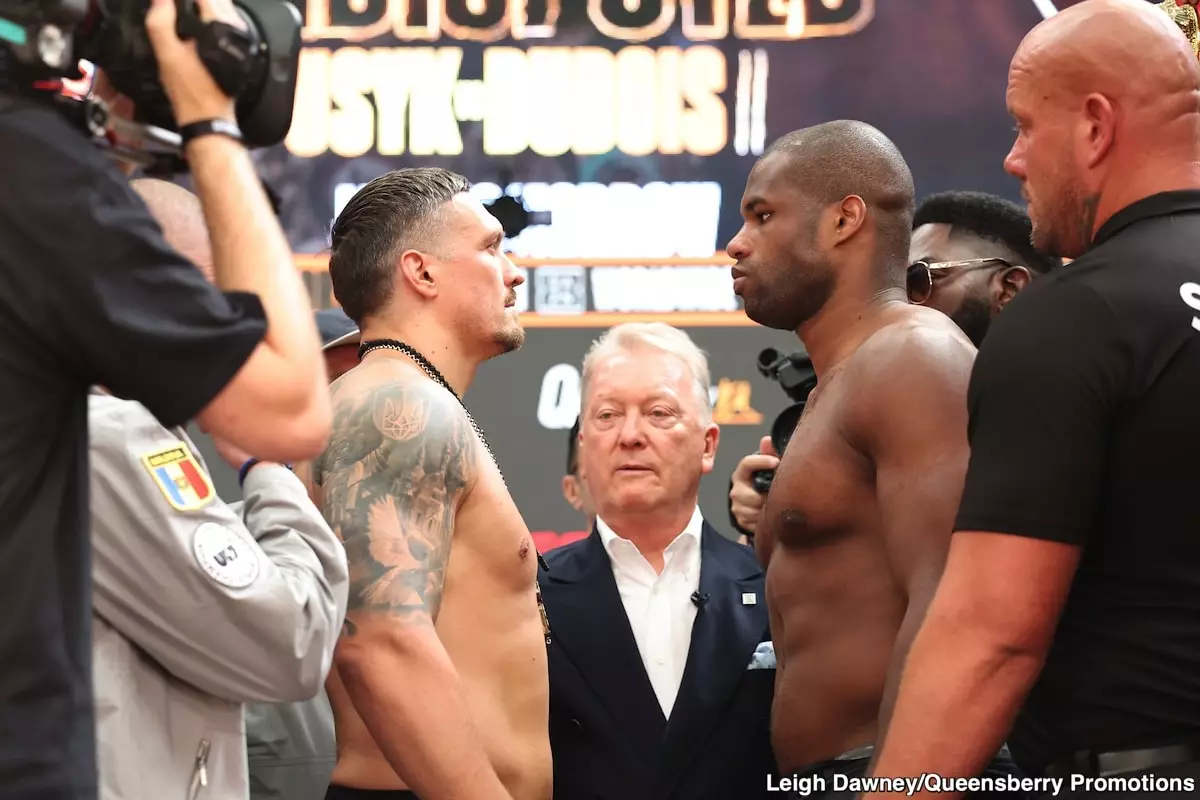In a stunning turn of events, Oleksandr Usyk asserted his undeniable prowess by delivering a crushing fifth-round KO with a masterful combination that shocked boxing fans worldwide. This victory not only reaffirmed Usyk’s mastery but also showcased his strategic adaptability, turning what was expected to be a grueling decision into a decisive affirmation of his skill. Dubois, eager to capitalize on his recent string of knockouts against less formidable opponents, entered the fight with confidence but quickly found himself overwhelmed by Usyk’s tactical finesse and resilient pressure.
From the onset, Usyk demonstrated a calculated approach, using his speed and ring IQ to neutralize Dubois’s raw power. Dubois’s aggressive tendencies, often his strength, became his undoing as he overextended in pursuit of a knockout, leaving himself vulnerable. The moment Usyk capitalized with a surgically precise left hand was a testament to his experience and ring craft. When Dubois rose after the first knockdown, he looked visibly shaken. That vulnerability was exploited moments later by a blistering left hook—an early warning of the night’s outcome. The stoppage at 1:52 of the fifth round symbolized not merely a physical knockout but the psychological and tactical dominance Usyk exerted throughout the fight.
This victory is crucial in cementing Usyk’s status as the undisputed heavyweight champion—yet it also raises questions about Dubois’s trajectory. Despite his recent confidence-boosting wins, particularly over fighters like Joshua, Hrgovic, and Miller, those victories were against opponents who didn’t possess the movement or durability required to challenge a tactician of Usyk’s caliber. Dubois’s recent success seemed to mask deeper vulnerabilities—most notably his susceptibility to intelligent, evasive fighters. His refusal to adapt during the fight’s critical moments exposed a fundamental flaw: the inability to handle dynamic, high-level competition.
The Underwhelming Co-Main and the Broader Card
While Usyk’s sensational victory dominated the headlines, the undercard bouts revealed much about the current state of heavyweight and cruiserweight divisions. Lawrence Okolie’s uninspired decision victory over Kevin Lerena, for instance, was emblematic of a division hampered by stagnation. Okolie’s physical advantage—standing tall at 6’5” and weighing a hefty 262 pounds—should have been decisive, but his lack of aggression and the sluggish pace resulted in a lackluster performance that underwhelmed viewers. His recent weight gain, which sapped his speed and energy, betrays a troubling trend: the danger of relying solely on size rather than skill and technique to dominate.
Meanwhile, the lightweight clash between Daniel Lapin and Lewis Edmondson was a contentious affair. Lapin’s amateurish style—focused on scoring points rather than asserting dominance—yielded a narrow decision. Critics would argue that the judges favored the cleaner work rather than recognizing Edmondson’s more consistent aggression, suggesting the scoring system still favors technicality over ring dominance. This bout underscores the need for fighters to evolve beyond mere tap-tap punches and embrace a more comprehensive approach to their craft if they hope to stand out at the highest levels.
The Dacres-Sirenko matchup was a stark reminder of how crucial defense and power are in securing dominance. Dacres’s sharp, disciplined boxing displayed commendable skill, effortlessly outclassing a sluggish Sirenko. Despite the lack of knockout power, Dacres’s ability to control the fight with precise, consistent shots demonstrated a tactical superiority. It also exposed Sirenko’s notable defensive flaws, which could hinder his prospects against more dynamic opponents. These fights, while less glamorous, reveal the nuances of skill and strategy that often determine success in the heavyweight division.
The Significance of Usyk’s Strategy and Future Outlook
Usyk’s victory epitomizes a broader trend—modern boxing’s shift towards finesse and tactical intelligence over brute strength. While the heavyweights have historically valued knockout power, Usyk has proven that location, timing, and patience can be even more devastating. His ability to adapt mid-fight and exploit opponents’ mistakes—such as Dubois’s over aggression—is a hallmark of elite boxing psychology. What makes this victory even more significant is how it reasserts Usyk’s technical superiority, making a statement that size alone cannot guarantee victory against a well-prepared, intelligent opponent.
Dubois’s recent wins have elevated his confidence, but they also highlight a perilous over-reliance on power. Facing Usyk, a fighter renowned for his defensive skills and movement, exposes these vulnerabilities. Dubois’s rumored mental weaknesses—evidenced by his prior quitting and shaky chin—loom over his future prospects. Will he learn from this defeat and evolve, or will he fall victim to the same pitfalls that have hindered many power-focused fighters in the past? The upcoming months will determine whether Dubois can adapt or succumb to the pressure of fighting at the highest level.
Usyk’s style, which combines movement, precision, and an underrated knockout threat, signals a new era of heavyweight boxing. Fighters who rely solely on raw power may find themselves at a crossroads—either to reinvent themselves or face the harsh reality of being outboxed and outthought. For fans, this fight is a reminder that boxing remains a sport of stratagem, patience, and technical mastery. The heavyweight division, once dominated by towering punchers, is now gradually embracing a more sophisticated approach—one that Usyk embodies fully.
His victory at Wembley not only underscores his current dominance but sets the stage for future matchups that promise to be even more strategic and compelling. As the division continues to evolve, Usyk’s blend of speed, skill, and resilience affirms his place among the modern greats—an undisputed champion who prefers to outthink rather than outmuscle his opponents. It’s a refreshing reminder that in boxing, intelligence often triumphs over raw strength, and Usyk’s latest triumph is a testament to that truth.

